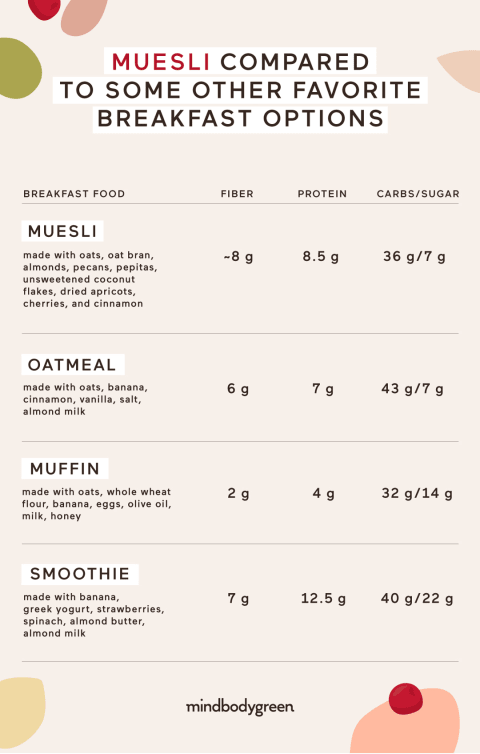Advertisement
Should You Add Muesli To Your Breakfast Rotation? An RD Explains


Muesli is a classic and favorite European breakfast that can pack a lot of nutritional punch. In many cases, muesli may also be lower in sugar and higher in protein and fiber than many other breakfast choices (and cereals). Unlike many of the other members of the cereal family, muesli tends to be less processed and more complete with better-for-you ingredients. But how healthy is it, really?
Is muesli healthy?
Muesli is primarily an oat-based cereal, often made up of a combination of oats, dried fruits. and nuts. Muesli generally contains more healthy fiber, protein. and fat than more cereals and tends to be less processed, too.
Besides the fact that it tastes good, there are plenty of health-conscious reasons to eat muesli. Though muesli can contain a good amount of added sugar by means of a lot of dried fruit, it also contains plenty of good-for-you fiber and healthy fats (as well as some minerals and other key nutrients).
Some of the main components of muesli contain some key nutritional benefits:
- Oats: Oats contain beta-glucan, a nutrient that may help to reduce cholesterol and improve heart health1, and it's been found to be helpful in boosting immune health too1. Oats are also a source of fiber and minerals like calcium, magnesium, and iron—key for brain, muscle, and bone health.
- Honey: Honey is naturally antibacterial and antiviral, and it contains plant-based flavanoids that are anti-inflammatory and immune-boosting. Buy local honey to help support allergies in a new area you may be visiting.
- Almonds and walnuts: Almonds and walnuts are frequently used in muesli (usually one or the other), and both contain heart-healthy monounsaturated fats that are anti-inflammatory; both also contain many minerals like iron, calcium, magnesium, and manganese.
- Dried fruit: I recommend using dehydrated fruit to minimize sugar, but dried fruit is a good source of heart-healthy potassium. Tart cherries are usually used in muesli, and they're a source of antioxidants and may also be helpful in reducing blood sugar and cholesterol levels2.
- Chia seeds: When you make your own muesli, you can add seeds of your choice. Chia seeds have a high omega-3 fat content, fiber, calcium, thyroid-healthy selenium, and magnesium. You can choose to use pepitas, flax, or sunflower seeds as well, too.
How does muesli compare to other breakfasts?
When compared to other common breakfasts, Muesli comes out ahead because it's unprocessed, loaded with fiber and nutrients, and completely plant-based. Here's a breakdown:

How can you serve it in a healthy way?
Try serving muesli with a higher-protein, higher-fat milk, like organic 1 to 2% milk, or an unsweetened hemp, almond, or even oat milk. With nondairy milks, be sure to watch for grams of sugar, as it can be easy for these to creep up. Look for unprocessed versions of these nondairy milks as well, aiming for a list of ingredients of five or six or less.
The bottom line.
Muesli is great—particularly muesli that you make yourself, or that's lower in sugar. Try to stay away from mueslis that are made with excessive amounts of dried fruit, and stick to those that contain more nuts and oats to keep sugar to a minimum. Plus, the extra nuts and added seeds (if you choose to include them) help to promote satiety and keep you feeling fuller all day long.

Why Nutrition Is Key To Changing Your Relationship With Alcohol
Brooke Scheller, DCN, CNS

Why Alcohol Sabotages Your Gut Health & How To Get Back On Track
Brooke Scheller, DCN, CNS

Why Nutrition Is Key To Changing Your Relationship With Alcohol
Brooke Scheller, DCN, CNS

Why Alcohol Sabotages Your Gut Health & How To Get Back On Track
Brooke Scheller, DCN, CNS

Why Nutrition Is Key To Changing Your Relationship With Alcohol
Brooke Scheller, DCN, CNS

Why Alcohol Sabotages Your Gut Health & How To Get Back On Track
Brooke Scheller, DCN, CNS

Why Nutrition Is Key To Changing Your Relationship With Alcohol
Brooke Scheller, DCN, CNS

Why Alcohol Sabotages Your Gut Health & How To Get Back On Track
Brooke Scheller, DCN, CNS














